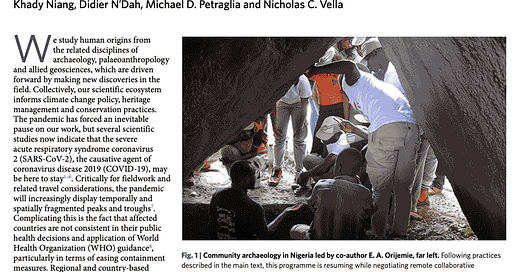Research highlight: How the pandemic must change field research
A group of field scientists come together to evaluate the impact of COVID-19 on our work.
Citation: Eleanor M. L. Scerri, Denise Kühnert, James Blinkhorn, Huw S. Groucutt, Patrick Roberts, Kathleen Nicoll, Andrea Zerboni, Emuobosa Akpo Orijemie, Huw Barton, Ian Candy, Steven T. Goldstein, John Hawks, Khady Niang, Didier N’Dah, Michael D. Petraglia and Nicholas C. Vella. Field-based sciences must transform in response to COVID-19. Nature Ecology and Evolution 4, 1571–1574. https://doi.org/10.1038/s41559-020-01317-8
The COVID-19 pandemic is exposing many structural problems with international scientific funding and collaborations. Most of these problems have been evident for a long time, especially the unsustainability of frequent short-term travel, and the lack of investment in scientific infrastructure and human capital in developing nations. In this article, I worked with many archaeologists, geologists, and other field-based scientists to describe these problems and suggest steps toward solutions.
“The pandemic will allow us to fundamentally remodel the way field-based sciences are taught, conducted and funded — but only if we stop waiting for a ‘return to normal’.”




